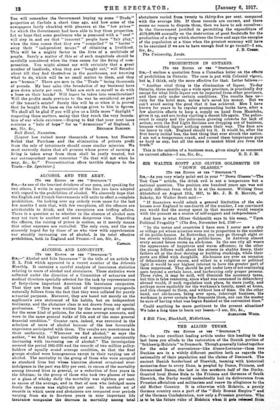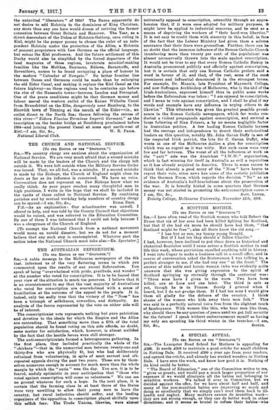THE ALLIED TERMS.
(To THE EDITOR or TEL " SPECTATOR.") SIR,—In your excellent leading article tinder this heading in the last issue you allude to the restoration of the Danish portion of "Schleswig-Holstein" to Denmark. Though generally linked together for the sake of convenience—like Alsace-Lorraine—these two Duchies are in a widely different position both as regards the nationality of their population and the claims of Denmark. The ancient Danish borderland of Sleswick, teeming with historical memories dear to every Dane, is peopled by Danes, Frisians, and Germanized Danes, the last in the eoutthern half of the Duchy. Granted local Home Rule to the Frisians and Germans of South Sleswick, the Duchy would undoubtedly hail its deliverance from Prussian officialism and militarism and renew its allegiance to the old Mother Country. It is otherwise with Holstein, a purely German country once a part of the " Holy Roman Empire " and of the German Confederation, now only a Prussian province. Who is to be the future ruler of Holstein when it seta released from the uninvited "liberators" of 1864? The Danes apparently do not desire to add Holstein to the dominions of King Christian, any more than any one here would dream of reviving the former connexion between Great Britain and Hanover. The Tsar, as a direct descendant of the Dukes of Holstein-Gottorp, once ruling in Kiel, might be the proper person to choose tho ruler of an inde- pendent Holstein under the protection of the Allies, a Holstein of peasant proprietors with Low German as the official language, but minus the Kiel professors. And the future settlement of this Duchy would also be simplified by the forced departure of the land magnates of these regions, inveterate mischief-making families like the Molikes, Rantzaus, Billows, Bernstorffs, and Reventlows, names to be found occupying a place of honour in the modern "Calendar of Newgate." No better frontier line between Danes and Germans could be made than by enlarging the old Eider Canal, and making it replace the Kiel Canal as the future highway—as these regions used to be centuries ago before the rise of the Hanseatic towns—between London and Petrograd. One of the peace conditions might be that German money and labour moved the western outlet of the Kaiser Wilhelm Canal from Brunsbiittel on the Elbe, dangerously near Hamburg, to the Sleswick town of Dinning at the mouth of the Eider—viz., an outlet direct to the North Sea; thence following the course of this river—"Eidora Fluvius Terminus fmperii Germani," as the inscription on the border bridge at Rendsburg proclaimed before 1864—and joining the present Canal at some spot north-west of











































 Previous page
Previous page